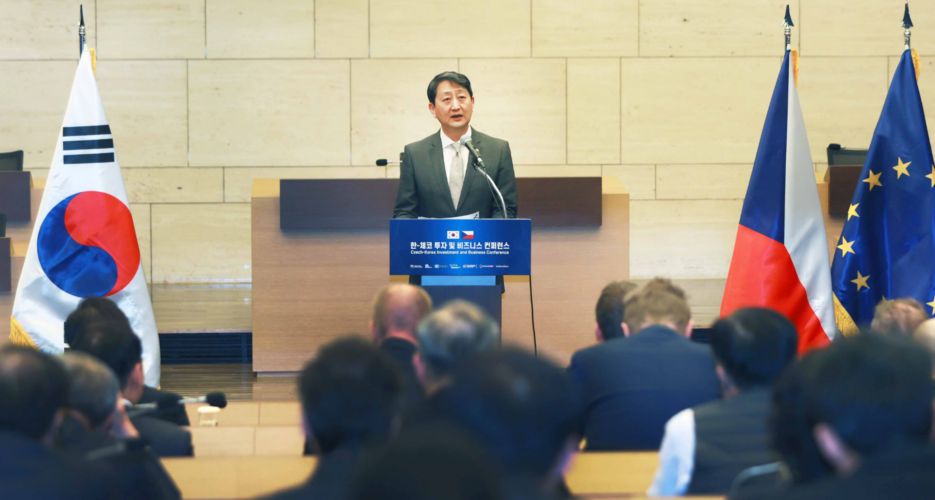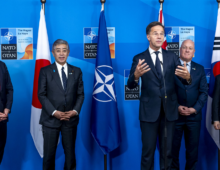With a confidential Westinghouse settlement in place, Seoul’s nuclear push now depends on pricing, politics and demand
South Korea and the Czech Republic reaffirmed their commitment to energy and nuclear cooperation during ministerial talks in Seoul on Monday and Tuesday. The 2nd South Korea-Czech Supply Chain & Energy Dialogue focused on expanding collaboration in nuclear power, advanced industries and clean energy. The South Korea-Czech Energy Technology Forum brought together over 150 government, industry and research leaders to discuss carbon-free energy technologies, including nuclear power, hydrogen and energy storage systems.
The meetings come as Korea Hydro and Nuclear Power (KHNP) awaits the finalization of its $17.4 billion contract to build the Dukovany Nuclear Power Plant in the Czech Republic. The deal was delayed by a temporary regulatory review after legal challenges from Westinghouse (U.S.) and EDF (France). The settlement between Westinghouse, KEPCO and KHNP in January resolved the intellectual property dispute, clearing a path for the Czech project to move forward. However, the specific terms of the settlement remain confidential.
WHY IT MATTERS
The Westinghouse settlement removed a legal obstacle for South Korea’s nuclear energy exports, but it likely created a financial one. The confidential resolution likely involved some form of licensing or profit-sharing agreement, meaning KHNP’s nuclear exports may no longer be fully independent. Even if KHNP secures the Czech contract, a portion of the profits will likely flow to Westinghouse, raising long-term cost concerns for South Korea’s nuclear industry. If these royalty arrangements are too burdensome, KHNP could lose its pricing advantage in future European bids, particularly in Romania and Poland, where South Korea hoped to expand its presence.
While the South Korea-Czech meetings may have helped to reaffirm Seoul’s competitiveness, KHNP’s international expansion is now likely subject to Washington’s financial and strategic considerations. The nuclear sector is highly politicized, and any future shift in U.S. policy — especially under the Trump administration’s “America First” policy — could negatively impact South Korea’s export prospects. However, the Czech contract remains a test case that could determine whether South Korea can emerge as a true global nuclear power provider or remain dependent on U.S. oversight.
South Korea and the Czech Republic reaffirmed their commitment to energy and nuclear cooperation during ministerial talks in Seoul on Monday and Tuesday. The 2nd South Korea-Czech Supply Chain & Energy Dialogue focused on expanding collaboration in nuclear power, advanced industries and clean energy. The South Korea-Czech Energy Technology Forum brought together over 150 government, industry and research leaders to discuss carbon-free energy technologies, including nuclear power, hydrogen and energy storage systems.
The meetings come as Korea Hydro and Nuclear Power (KHNP) awaits the finalization of its $17.4 billion contract to build the Dukovany Nuclear Power Plant in the Czech Republic. The deal was delayed by a temporary regulatory review after legal challenges from Westinghouse (U.S.) and EDF (France). The settlement between Westinghouse, KEPCO and KHNP in January resolved the intellectual property dispute, clearing a path for the Czech project to move forward. However, the specific terms of the settlement remain confidential.
Get your
KoreaPro
subscription today!
Unlock article access by becoming a KOREA PRO member today!
Unlock your access
to all our features.
Standard Annual plan includes:
-
Receive full archive access, full suite of newsletter products
-
Month in Review via email and the KOREA PRO website
-
Exclusive invites and priority access to member events
-
One year of access to NK News and NK News podcast
There are three plans available:
Lite, Standard and
Premium.
Explore which would be
the best one for you.
Explore membership options












